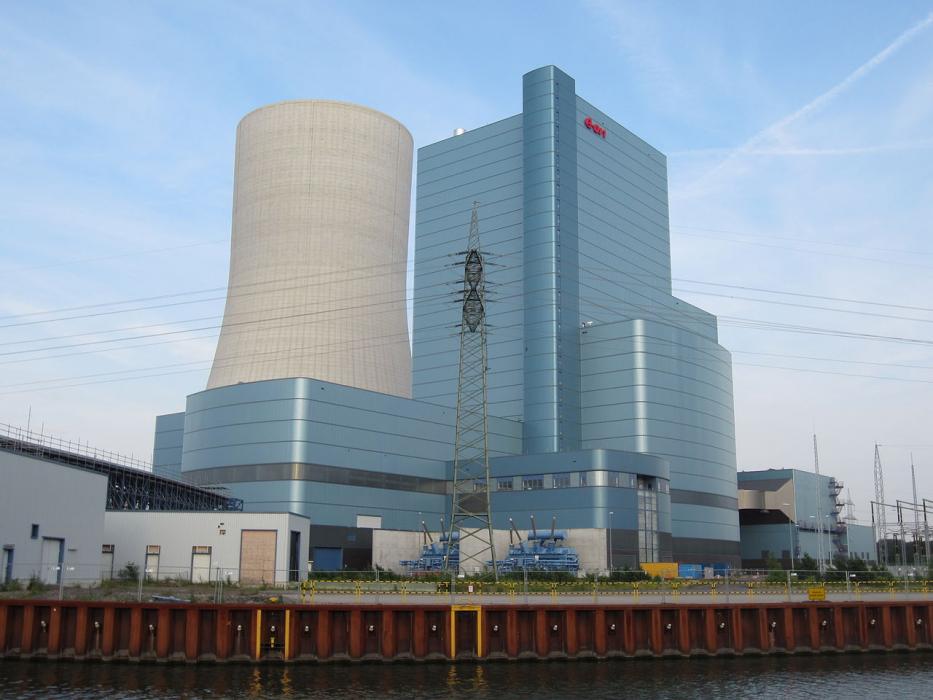Germany laggard in assessing fossil investment risks - Deutsche Börse
Clean Energy Wire: What is a green investment?
Kristina Jeromin: That question is not so easy to answer as the financial industry is still in the process of defining it. In manufacturing industries, be it cars or chemicals, we already have an idea which sustainability criteria we need to apply, for instance by looking at their CO2 emissions or their water pollution, by checking if workers in their supply chain are being exploited and so on. The dieselgate affair or the current troubles at the Hambach Forest are good examples for sustainability debates in the automotive and energy industries.
 However, things are different when looking at the financial industry. For the longest time, the carbon footprint of banks had been determined by looking at their power bill – but it’s questionable whether this is a good indicator or the best leverage a bank has to make our economy more sustainable. It is perhaps more useful to ask who funds what when and how and which information has to be disclosed to make sure that the funding takes place at all.
However, things are different when looking at the financial industry. For the longest time, the carbon footprint of banks had been determined by looking at their power bill – but it’s questionable whether this is a good indicator or the best leverage a bank has to make our economy more sustainable. It is perhaps more useful to ask who funds what when and how and which information has to be disclosed to make sure that the funding takes place at all.
What good would that do?
The financial crisis that started 10 years ago, in 2008, has showcased that medium- and long-term sustainability criteria, meaning ESG [Environmental Social and Governance] criteria, have not been accounted for at all in the financial sector’s core business areas. Instead, risky short-term investments were made that created bubbles and the entire system’s stability had been compromised. Sustainable finance is an attempt to make good for these shortcomings, meaning that you carry out conventional risk management for the financial services industry and include ESG factors, which enable a holistic view of a companies’ risk profile and enhances transparency. This is also a means to figure out how stranded assets can be avoided.
Could you give an example?
Sure. Anyone who thinks ahead probably would no longer finance a new coal plant in Germany because there soon will be an official end date for coal in the country. This means you’d invest money that you would probably never get back, let alone make a profit with. So, even if this seems like a straightforward conclusion for the average consumer, we still have to establish it in the financial industry’s way of working. But applying a different approach does not mean that you simply abstain from certain kinds of investment but rather that you open up an entire array of new portfolios for green investments.
Both private and institutional investors can invest their money in sustainable ventures, for example in renewable energy projects, in companies that have a strong track record in respecting workers’ rights or put great emphasis on good governance, have transparent reporting standards for their business activities and so on. A green investment therefore is an investment that accounts for indirect risks such as climate change and, in the best case, also has a positive added value in terms of addressing the challenges we face in today’s world.
So a green investment is not necessarily associated with environmental protection?
That’s correct, there’s much more to sustainability than the environment. In fact, there is a fundamental debate whether we should speak of ‘green finance’ or of ‘sustainable finance.’ We at Deutsche Boerse and in the Green and Sustainable Finance Cluster (GSFC) Germany prefer to speak of sustainable finance, because this incorporates all three ESG criteria. ‘Sustainable finance’ indicates that it is not only about protecting the environment but also about stress-testing our own industry, because it assesses how fit it is to cope with challenges of the future. However, under this sustainability umbrella, many financial products are exclusively focussed on climate action.
But why is this whole idea coming up only now or in the last few years? How can I, as a private customer, be sure that this not only amounts to a greenwashing of an industry that has fallen into disrepute after 2008?
There’s an intrinsic interest in the financial industry to revise its risk-management strategies. If we want to avoid another financial crisis and re-establish and maintain systemic stability in the industry, the conventional parameters and definitions we have used so far in the investment process no longer will do. They have to be supplemented with criteria from the sustainability portfolio. So, on the one hand, this is an act of mere commercial rationality by the industry that minimises risks. On the other hand, financial regulators have begun to take an interest in transforming the way the industry operates.
The European Commission’s Action Plan on Sustainable Finance is a case in point that will alter the legal framework in EU member states. Also, implementing the Paris Climate Agreement and the UN Sustainable Development Goals will require tremendous investments in a more sustainable economy but the financial services infrastructure that makes it possible to carry out these investments sustainably is not yet in place. And extreme weather events, like the hot and dry summer we’ve had in Germany this year, also change the way many ordinary citizens think about how we as a society do business.
Could it be considered an act of self-preservation by the financial industry?
Yes, and I believe rightfully so. Self-preservation means that we do not exist in isolation but that we are part of a larger economic and social system that we cannot detach ourselves from. Climate change affects each and every one of us and it is necessary to identify who is responsible for what in this context and to make sure that everyone lives up to this responsibility. If this was merely a PR stunt to greenwash the industry’s image, this could backfire very quickly as soon as the political mood starts to change.
Not only the financial industry, but also companies from the so-called real economy - and both are closely linked - need to be concerned about their long-term survival. This will change their strategy and this is what we want to achieve with initiatives like the Hub for Sustainable Finance and the Green and Sustainable Finance Cluster here in Germany.
Tarek Al-Wazir, the economy minister of the federal state of Hesse, home to Germany’s financial centre Frankfurt, has said, ‘Germany’s voice must make itself heard’ in the process of making finance more sustainable. What does Germany’s voice say and how is the country positioned in this respect?
The German financial sector has long been reluctant to address sustainability as an important issue. Compared to other countries in Europe, it lags behind. In other financial centres, like Luxembourg, Paris or London, there already is a much more developed and robust infrastructure for sustainable finance. There’s greater cooperation and networking between the industry, policymakers and civil society and this has already resulted in concrete regulation. In France, for example, investors are compelled to disclose the carbon footprint and climate impact of their projects.
This degree of transparency does not yet exist in Germany, but the topic is gaining more and more awareness. We still have quite a way to go before green bonds come out of their niche and turn into regular instruments that automatically factor in sustainability. But once this has happened, sustainable finance could actually become an asset for financial centres and make them more attractive for investors who see that contemporary challenges are adequately addressed. It’s not just about risk management and damage control, but also about seizing opportunities that are set to eventually arise. We are trying to promote this understanding by building up a sustainable finance network for stakeholders in Germany. An economic system needs a clear regulatory framework and policymakers from the finance ministry, the environment ministry and elsewhere have to provide it.
So the finance industry actively calls for regulation? Isn’t that unusual?
Yes, this is quite unusual – and it concerns other industries too. But it shows where we stand now. Many major companies like Siemens in 2017 called on the German government to make progress on Germany’s comprehensive energy transition, the Energiewende, and to end coal-fired power production. That large industrial players such as Siemens have to exhort policymakers to provide regulation shows that industry is seeking planning security. We need clear rules that allow for a sustainable way of doing business. For some industries, the transformation towards a more sustainable system will also include taking challenging steps. On the other hand, there are also companies that still seem to think that the Energiewende might not be fully implemented. They too need regulation and clear guidelines from policymakers.
The view from abroad often still is that Germany is fairly advanced in addressing environmental challenges. But this apparently does not apply to the financial sector?
To be honest, I think this is not only the case for the financial sector. Amongst other things, Germany’s Energiewende has not been implemented as much as it could have been and the coal exit is still pending. In some areas, Germany has given up a leading position and an innovative and ambitious attitude in favour of a much more reluctant and cautious approach. The financial industry, which has a very cross-sectoral character as it has ties to virtually all other sectors of the economy, basically just mirrors this inhibition. The finance industry funds innovation in the economy and if you look at many different industries, there are promising projects and business ideas, but there could be more courage to induce change.
Could you say that the Energiewende cannot succeed with a parallel transition in the financial sector?
The financial industry has supported and funded Germany’s energy transition up to the point where it stands now. It is not solely responsible for completing the Energiewende but it can give an important signal if financial companies say they will no longer invest in certain projects. Take the hydraulic lift provider Gerken, which said it would no longer allow the use of its products to clear the Hambach Forest from protesters. Police used it to reach the protesters’ tree houses, but Gerken said it neither knew about this nor endorsed it. In a way, financing a project is like using a hydraulic lift. Knowing what a borrower intends to do with your bank credit is an informed and responsible act of investment. But if you have no idea what happens with the money, you have no knowledge of the risks of your investment and the potential reputational damage you may incur.
Usually, banks invest money to make a profit. Can you make money with sustainable investments and are growth and sustainability not mutually exclusive?
There is clear evidence that sustainable investments are not less profitable or are even slightly more profitable than conventional investments. And it is indisputable that sustainable investments are less risk-prone than other investments, meaning they deliver more stable returns over a longer period of time. If you were a carmaker and account for facts like air pollution in cities or climate change that is partly caused by car emissions, it is less likely that disasters like the dieselgate scandal will happen to you. If you factor this in as an investor, there’s less risk that you’ll lose money.


